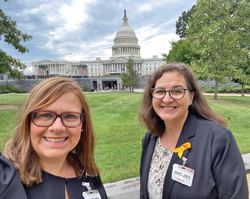Local mother advocates for cancer cure
by Dan Holland
For Brecksville resident Ann Ramer, advocating to find cures, better treatments and better policies to battle childhood cancer has become not only a passion, but her profession.
Ramer, who currently works as a regional health officer for the Ohio Department of Health, was recently involved in writing the state cancer plan in Ohio. Two of her four children were born with Li-Fraumeni Syndrome, a genetic disorder that involves the mutation of a gene that suppresses tumor formation. Her son Brent passed away in 2018 at the age of 18 from complications of acute myeloid leukemia.
“I started out as a parent in a work group to establish the goals and strategies for childhood cancer,” Ramer explained. “Childhood cancer wasn’t even mentioned in the previous state plan, so this is brand new work that we’re really proud of.”
She previously worked for the Association of State and Territorial Health Organizations, who endorsed her to do work with The Coalition Against Childhood Cancer.
“The work involved establishing how many states actually mention childhood cancers in their plans, and how we might set forth efforts to get inclusion in those state plans,” Ramer said.
Her travels have included attending a number of national summits on childhood cancer, including a briefing at the White House last September to address the congressional Childhood Cancer Caucus as part of the Cancer Moonshot Initiative, and also a presentation she did for the Childhood Cancer Data Institute, which is part of the National Cancer Institute in Washington, D.C.
“I did a presentation for CCDI in November, and they want me to come down and serve at the end of March on a panel for a symposium that they’re hosting,” she explained. “NCI is part of the National Institute of Health; part of the Cancer Moonshot Initiative.”
At the local level, the annual Kick-It event, sponsored by staff, students and parent school organizations of Brecksville-Broadview Heights Middle School, raises funds to battle childhood cancer.
“They raise around $30,000-$40,000 a year,” said Ramer. “When you get everyone focusing on the same goals, these kids raise a lot of money for the cause, which is an amazing thing. It’s so powerful, because it teaches them in the context of childhood cancer, and the kids learn that concept and realize the power of the collective and that they can apply that to whatever passion project they may have down the road.”
Ramer explained that Kick-It has been absorbed as a component of the much larger Alex’s Lemonade Stand Foundation, a national group founded in 2005 by the parents of Alexandra Scott, a 4-year old girl from Connecticut who began raising funds to battle childhood cancer in 2000 with a lemonade stand in her front yard. By the time Alexandra, who suffered from neuroblastoma, passed away in 2004 at age 8, her efforts had raised more than $1 million for the cause.
Ramer’s daughter Lauren, 20, who has battled cancer throughout her life, is currently studying to become a pediatric oncology nurse at Capital University in Columbus.
“She wants to use her experience to then serve those to whom she’ll be able to relate to their experience. I’m so very proud of her,” said Ramer.
Through her advocacy efforts, Ramer hopes that her efforts will help to make the path less bumpy for other families.
“I know how it is when so much of your life feels out of control; you can’t control that your child has cancer or how the treatment is going or if it will be effective,” she said. “But to have some control over some other things and say, ‘this I can do something about’ and empower others to make changes that need to be made, I find that personally rewarding.”
Ramer worked to effect policy changes to allow cancer patients under the age of 18 to be able to participate in adult clinical trials.
“I don’t ever want to share our story and have it just be a sad story,” said Ramer. “I want it to serve a purpose, and when I talk about our family’s experience, it’s to change a policy that I know needs to be changed. Brent was delayed from his treatment when he relapsed, and we needed an adult clinical trial, but he was 17 and was ineligible. I knew that was a terrible policy, and I worked with other people to get that changed. I want to be that nameless, faceless person working to make the path so much easier for others facing similar challenges.” ∞

attends a number of national summits on
childhood cancer, including a briefing at
the White House in September to participate in the Cancer Moonshot Initiative. Photo submitted.
